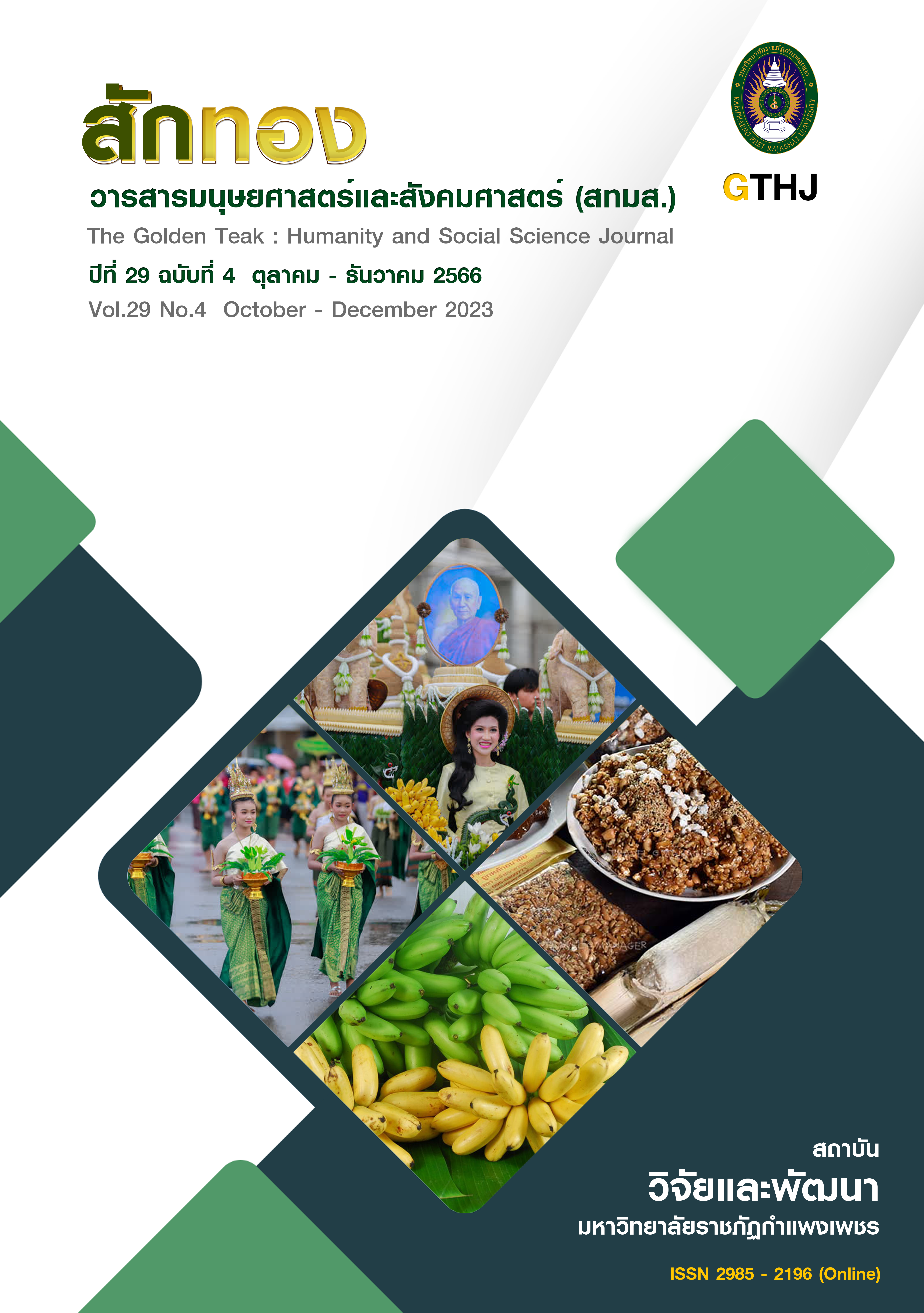Development of the Khao Muk Krong Nature Trail, Phang Nga Province by the Co-Design Process
Main Article Content
Abstract
Ban Khok Krai community has community-based tourism. The community tourism enterprise group want to develop the Khao Muk Krong Nature Trail as a new tourist destination. Objectives of this research were to study the composition and pattern of the Khao Muk Krong Nature Trail through a participatory design process and to suggest guidelines for the development of routes and facilities for Khao Muk Krong tourism. Researchers design research methods using a collaborative design process. The steps were 1) joint learning to identify challenges 2) search for opportunities for development of Khao Muk Krong 3) understand the development method 4) Do the design together and check the design results. The results showed that community members participated in determining the objectives and goals of the nature trail. The results of the research presented the image of natural limestone mountains, the history of the mountains connected with the community’s way of life. The researcher proposes a design idea for tourism facilities. Design work supports adventure travel by using natural materials. The building overlooks the natural scenery, with signs communicating the names of plants, herbs and rare wildlife. In addition, a one-day trip program is designed and the focus is on setting environmental management guidelines.
Article Details

This work is licensed under a Creative Commons Attribution-NonCommercial-NoDerivatives 4.0 International License.
บทความที่ได้รับการตีพิมพ์เป็นลิขสิทธิ์ของวารสาร สักทอง : วารสารมนุษยศาสตร์และสังคมศาสตร์ สถาบันวิจัยและพัฒนา มหาวิทยาลับราชภัฏกำแพงเพชร
ข้อคิดเห็นใดๆ ที่ปรากฎในวารสารเป็นวรรณกรรมของผู้เขียนโดยเฉพาะ ซึ่งมหาวิทยาลัยราชภัฏกำแพงเพชรและบรรณาธิการไม่จำเป็นต้องเห็นด้วย
References
Chunyaboonthip, P. (2017). Community tourism and participation in conservation Environment of Nong Chai Wan Wetland, Ban Don Daeng. Si Songkhram District Nakhon Phanom Province International Thai Tourism Journal, 13(2), 47-62. [In Thai]
Kaewuthai, B., Kaewuthai, K. & Pornphanphaiboon, S. (2564). Development of a nature study path in the area of Khao Mook Krong, Ban Khok Krai Community, Thap Put District, Phang Nga Province. Phuket : Phuket Rajabhat University Research. [In Thai]
Kensing, F. & Greenbaum, J. (2012). Heritage : Having a say. In Routledge international handbook of participatory design. Routledge : Informa UK Limited.
Maneerot, N. (2017). Community-Based Tourism Management. International Thai Tourism Journal, 13(2), 25-46.
Mitchell, V., Ross, T., May, A., Sims, R. & Parker, C. (2016). Empirical investigation of the impact of using co-design methods when generating proposals for sustainable travel solutions. CoDesign, 12(4), 205-220.
Patrawat, J. (2010). A Guide to Participatory Action Research. Bangkok : Kasetsart University Faculty of Economics Cooperative academic institute. [In Thai]
Pedersen, S. (2020). Staging negotiation spaces: A co-design framework. Design Studies, 68, 58-81.
Pongsakornrangsilp, P. (2014). Sustainable Community Tourism Management: A Case Study of Ban Khok Krai, Phang Nga Province. Veridian E-Journal, Silpakorn University (Humanities, Social Sciences and arts), 7(3), 650-665. [In Thai]
Sarakarn, N. (2020, November 9). Local Wisdom Scholars in Community. Ban Khok Krai, Phang Nga Province. Interview. [In Thai]
Sarakarn, S. (2020, November 9). Chairman of Ban Khok Krai Community Tourism Enterprise Group. Ban Khok Krai, Phang Nga Province. Interview. [In Thai]
Somkiatkul, W. (2018, January-June). Participation in community environmental management for tourism development: a case study of Tambon Nam Phut communities, La-ngu district, Satun province. Uttaradit Rajabhat University Journal, 13(1), 47-63. [In Thai]
Thaesakul, P. (2020, November 9). Local Wisdom Scholars in Community. Ban Khok Krai, Phang Nga Province. Interview. [In Thai]
Thep Songkhroh, P. (1998, April-September). Ecology and Karst topography from a field in the south. Parichart Journal, 11(1), 63-82.
Thongma, W. (2017). Community-based tourism for improving the quality of life in forest areas. Chiang Mai : Maejo University. [In Thai]
Upala, P. & Bunnarong, S. (2017). Participatory Design Process for Improving Pedestrian Environment and Traffic Sign System: A Case Study of Anuban Ranong School. Area Based Development Research Journal, 9(1), 52-69. [In Thai]
Vejthanyakul, P. (2020). Ecotourism towards sustainable tourism. Journal of Sustainable Tourism Development, 2(1), 50-63. [In Thai]
Yimsrual, S. (2018). Tourism facilities and landscape design guideline for natural hot spring tourist attraction. Journal of Environmental Design, 5(2), 100-129. [In Thai]


